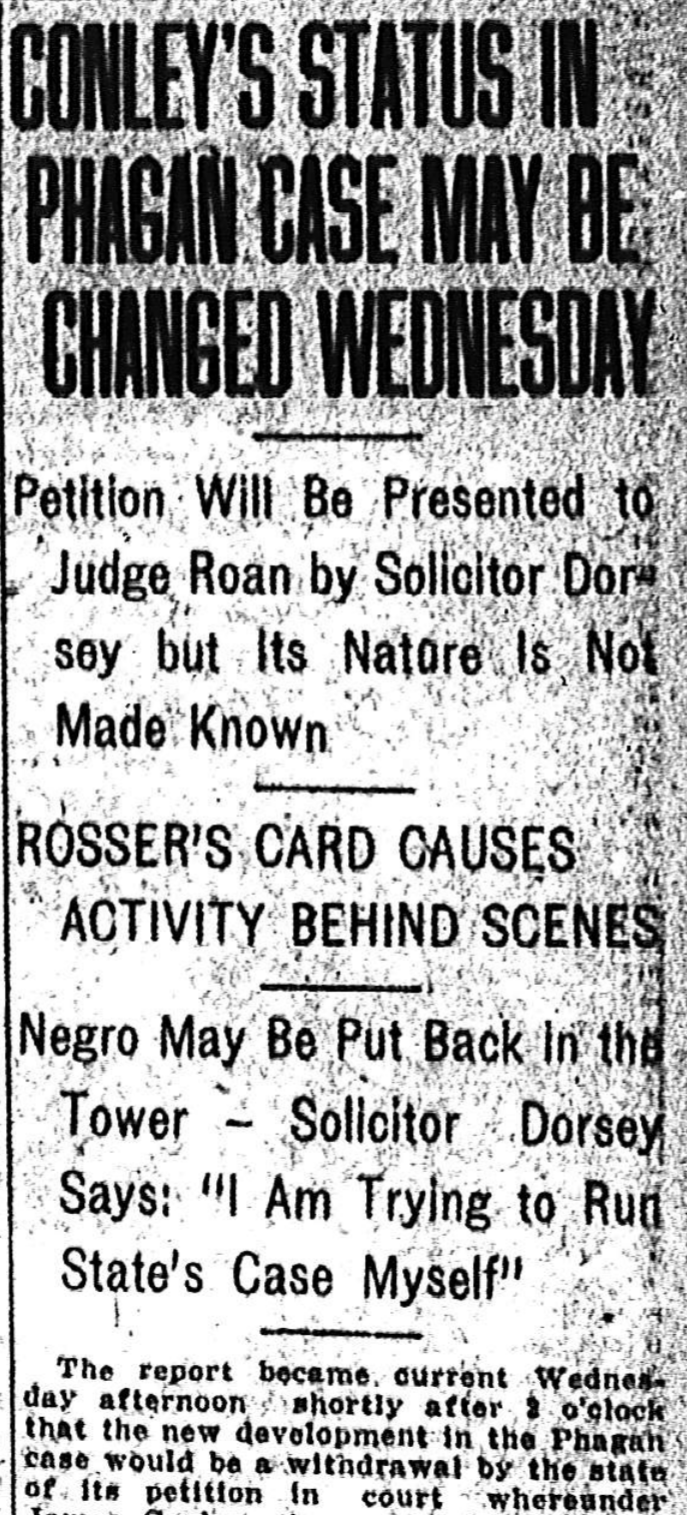 Another in our series of new transcriptions of contemporary articles on the Leo Frank case.
Another in our series of new transcriptions of contemporary articles on the Leo Frank case.
The Atlanta Journal
June 11, 1913
Petition Will Be Presented to Judge Roan by Solicitor Dorsey but Its Nature Is Not Made Known
ROSSER’S CARD CAUSES ACTIVITY BEHIND SCENES
Negro May Be Put Back in the Tower – Solicitor Dorsey Says: “I Am Trying to Run State’s Case Myself”
The report became current Wednesday afternoon shortly after 3 o’clock that the new development in the Phagan case would be a withdrawal by the state of its petition in court whereunder James Conley, the negro, is held as a material witness.
Shortly before 3 o’clock, William Smith, attorney for the negro, and Solicitor Dorsey appeared at the court house together, for this purpose, it was said.
Attorney Smith does not want the negro confined in the Fulton county jail, where he declares he was menaced during the one night that he spent there after his affidavit became public. There has been no insistence from Attorney Smith. It is said, that any damage whatever be made in the status of the negro.
As the result of the clash between the prosecution and the defense of Leo M. Frank, over James Conely, it is expected that the negro’s legal status will be changed in some way, probably Wednesday afternoon.
It is also barely possible that Conley will be indicted Thursday by the grand jury as an accessory after the fact of Mary Phagan’s murder, but this is not considered probable.
Conley is now at police headquarters, held by authority of an order from Judge L. S. Roan, of the criminal division of the superior court. Conley is held as a material witness in the case against Frank.
The negro sweeper was transferred soon after he made his sensational confession, charging Frank with being the principal in the Phagan murder, from police headquarters to the Tower, where he remained about twenty-four hours.
Then he was transferred again, on a superior court order, to police headquarters, his attorney, William M. Smith, consenting to the move.
The obvious reason for the transfer was to prevent the negro’s talking to interviewers, who are allowed into the jail if the prisoner has no objection to talking to them.
At police headquarters only the detective and sometimes the prisoners lawyer, is allowed to see him.
Conley’s attorney, William M. Smith, stated Wednesday that he would prefer for the negro to be incerated at police headquarters rather than at the tower.
JAILERS CAN PROTECT HIM.
The reason assigned by the detectives for removing Conley from the tower was his own statement to the effect that visitors at the tower had annoyed him as they passed his cell.
It is arguer, however, that the jailors can protect the negro if he is held in the tower, and if it is decided that from a strictly legal sense there is no authority for holding Conley at headquarters Wednesday night will probably find him in the tower again, held as a material witness.
As to the probability of the grand jury’s indicting the man either as an accessory or a principal, little can be said with any authority. Several of the individual jurors are said to be interesting themselves in the matter and many inquiries have been made as to the reason for the prosecuting official’s failure to bring a bill against the negro before the jury.
It is certain, however, that no bill charging Conley wtih being a principal will be presented by the solicitor’s office unless demanded by the grand jury.
The interest of the individual jurors makes it probable there will be action in the near future.
WHAT DORSEY SAYS.
Asked if Conley would be taken before the grand jury to tell his story to the citizens who indicted Frank for Mary Phagan’s murder, Solicitor General Hugh M. Dorsey said simply: “I am trying to run the state’s case by myself.”
L. H. Beck, the foreman of the jury, stated that the jury would take up[…]
(Continued on Page Six, Col. 7.)
CONLEY’S STATUS IN PHAGAN CASE MAY BE CHANGED WEDNESDAY
(Continued From Page 1.)
[…]during the present week only the matters presented to it by the solicitor.
Relative to the Conley matter itself, the grand jury foreman said that it was a criminal case of the type usually acted upon by the grand jury only when presented to it by the solicitor.
As to whether or not the grand jury would take the matter up of its own initiative next week, Mr. Beck would make no statement.
Mr. Rosser’s Position.
Relative to the lack of grand jury action in the Conley case Mr. Rosser, in his first statement since the Phagan investigation commenced, said:
“No one has been rude enough to bring this negro before the grand jury, nor, indeed, to make any charge against him.
After the statement of this negro and in view of all the evidence which so strongly points to him as the slayer of little Mary Phagan, is the grand jury to leave him without charge or investigation to be wet-nursed by Lanford until Frank’s trial?
Or is it the purpose to keep the negro’s case from the grand jury in the nature of an offered reward to spur him on to swear his worst against the white man?
Would it not be just and decent to bring this negro’s case before the grand jury and let that body hear his confession, so that it can then decide whether the negro should then be indicted?”
* * *